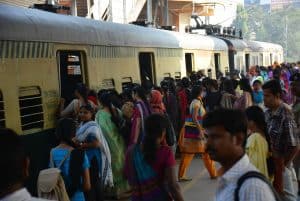The indefinite strike by workers of the transport department has completely derailed commute in Metropolitan Chennai, a city lauded for its integrated public transport module.
Thousands of commuters are stranded and roads are gridlocked in the city, but it is impossible to miss the sense the anger among transport department workers who have been off the roads for four days now. They did not call off the strike, despite being warned of termination from service by the Madras High Court. What could have prompted them to this level of desperation? It’s time to take a deeper look.

People throng the suburban railway stations, as buses are not an option for commute. Pic: Laasya Shekhar
The minimum ticket fare in Metropolitan Transport Corporation (MTC) buses is a subject of pride for a Chennaiite, who has to pay a comparatively higher price for a bus ride in any other South Indian city. While the neighbouring states of Kerala and Karnataka revised their fares on eight and 15 occasions respectively since 2011, Tamil Nadu did not do so even once. The last fare revision was done way back in 2011.
What we miss in all of this is that the transport department in the state — with eight interstate and intra-state services — is running huge losses. The 22,203 buses in Tamil Nadu, including 3,688 buses running in Chennai, make losses approximately at the rate of Rs 9/kilometre.
An affidavit submitted before the Madurai bench of the Madras High Court by the Additional Chief Secretary to the transport department, P W C Davidar, quotes the losses incurred by the department. The document states, “The state transport undertakings are making losses to the tune of Rs 9.42 crores per day. The department suffered a loss of Rs 2981.57 crores in 2016-17. The number is Rs 1527.72 in 2017-18, counted till the month of September last year.”
Who bears the brunt?
Employees of the transport department – drivers, conductors and the technical staff – bore the brunt of the losses, as their pays were not revised and pensions were not given. Many workers died without receiving their pension, while the ones in service is eagerly waiting for the pay revision that was supposed to happen in September 2016.
S. Vijayalakshmi has been running from pillar to post to acquire the pension due, since the death of her husband M Suresh Kumar in 2015. Suresh Kumar, who worked as a driver died due to alcoholism, when he was 47.
“The department gave us Rs 5000 when he died, for cremation. We have not got a single penny since. I have paid countless visits to the MTC headquarters over the past two years,” says Vijayalakshmi, who is now working as a maid to support the family.
The department has in fact slapped a sum of Rs 2.76 lakh on Suresh Kumar as punishment for reasons they did not bother explaining. “This is one of the many cost cutting strategies of the department. The department should explain why they punished Suresh Kumar and thousands like him,” said A. Ambikapathi, a retired bus conductor and the vice president of the Retired Employees Union.
Given such circumstances, workers have been seething. “The court says we would be terminated. The people are furious with us for demonstrating indefinitely and going on strike. But do we have an option? It is unfair for many of us who have toiled for hours together,” said M Chandran, state secretary, Centre of Indian Trade Unions (CITU).
Transport department turns into a sick unit
Talking about the difficult fiscal position of Tamil Nadu in general, the transport secretary admits that the department has major financial commitments outstanding on the account of pay revision requirements.
“With regard to the sum of Rs 1138.66 Crore for retired employees, a total of Rs 263.5358 crore was sanctioned to settle the dues in November 2011,” the affidavit mentioned. The number hints at the fact that only one-third of the pensioners may be availing the retirement benefit.
“You don’t grow if you are an employee of the transport department. Our pay is less than that of a government employee in any field,” says K Arumugam Nainar of the CITU.
Explaining the deteriorating situation of the transport department, an MTC official said: “The state has sanctioned various welfare schemes with a wide focus on school-going children, senior citizens and physically challenged people. It is an easy way to lure voters. But unfortunately, the financial situation of the department was not taken into account while announcing these schemes.”
The already bleeding transport department was not reimbursed for such schemes from other relevant government departments, such as school education and social welfare.
Since November 2017, the department has been relying completely on borrowed funds to provide pensions to its 70,367 pensioners (as on July 2017). The financial assistance provided by the state government was used up in paying salaries, and wage revisions and retirement benefits such as pension could not be taken care of.
Meanwhile, the state government has come up with new proposals in regard to small buses. But given the volume of debts borne by the department, it is high time that a survival strategy is carved out on priority, rather than new grandiose schemes.
Till then, agitated workers and hapless city commuters may continue to be in the headlines.
Nicely written.Thee legitimate demands of the workers has to be accepted.The daily loss may be due to mismanagement.This can be compensated by marginal increase in fare.We public donot mind paying few paise more but we need reliable and safe journey.
In-depth article!!! Well written!! And I witness a budding photographer..